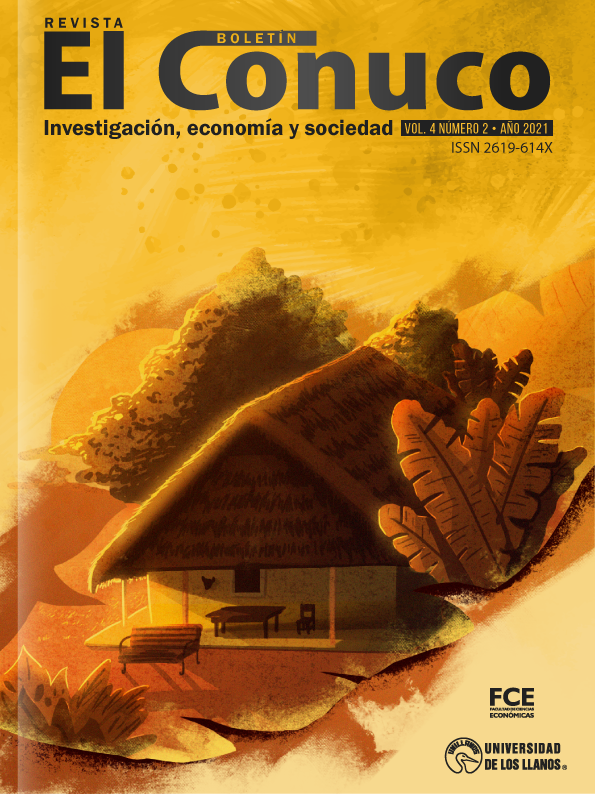La coinnovación en la relación productor de café y proveedor: caso del departamento del Meta
Co-innovation in the coffee producer-supplier relationship: the case of the department of Meta
Contenido principal del artículo
Resumen
Recientemente, el estudio de las relaciones comerciales desde el paradigma del marketing relacional ha tenido acogida en los agronegocios, pues busca comprender la importancia de las relaciones comerciales entre productor y proveedor. Así, el propósito de este artículo fue caracterizar el comportamiento de las distintas dimensiones de la calidad a partir de la relación comercial y sus variables. La metodología tuvo un enfoque descriptivo de tipo concluyente, con enfoque funcionalista. Para ello, se realizó una revisión documental general del sector del café en el departamento del Meta, junto con 41 encuestas a productores y 3 entrevistas a coordinadores de cadena. Los hallazgos se capitalizaron en la calidad, la innovación y la coinnovación entre productores de café y proveedores.
Descargas
Detalles del artículo
Palabras clave
Referencias
Agronet (s.f.). Red de información y comunicación del sector agropecuario colombiano. https://n9.cl/zxdv4
Arosa-Carrera, C. R. & Chica-Mesa, J. C. (2020). La innovación en el paradigma del marketing relacional. Estudios Gerenciales, 36(154), 114–122. https://doi.org/10.18046/j.estger.2020.154.3494
Cornella, A. (2014). Coinnovación: la ventaja de la innovación colaborativa. Harvard Deusto Business Review, 233, 46-52.
Delgado ‐ Ballester, E. & Munuera ‐ Alemán, J. L. (2005). Does brand trust matter to brand equity? Journal of Product & Brand Management, 14(3), 187-196. https://doi.org/10.1108/10610420510601058
El Tiempo. (1997, junio 03). Auge del café beneficia a productores del Meta. https://n9.cl/0ae2q
Gao, D., Xu, Z., Ruan, Y. Z. & Lu, H. (2017). From a systematic literature review to integrated definition for sustainable supply chain innovation (SSCI). Journal of Cleaner Production, 142, 1518–1538. https://doi.org/10.1016/j.jclepro.2016.11.153
Gellynck, X., Kühne, B. & Weaver, R. D. (2011). Relationship Quality and Innovation Capacity of Chains: The Case of the Traditional Food Sector in the EU. International Journal on Food System Dynamics, 2(1). https://doi.org/10.18461/ijfsd.v2i1.211
Gumilla, J. (1944). El Orinoco ilustrado: historia natural, civil y geográfica de este gran río. Tomo I. Biblioteca Popular de Cultura Colombiana.
Hakansson, H. (1982). International Marketing and Purchasing of Industrial Goods: An Interaction Approach. Wiley.
Hakansson, H., Ford, D., Gadde, L.-E., Snehota, I. & Waluszewski, A. (2009). Business in Networks. Wiley.
Kühne, B., Gellynck, X. & Weaver, R. D. (2013). The influence of relationship quality on the innovation capacity in traditional food chains. Supply Chain Management, 18(1), 52–65. https://doi.org/10.1108/13598541311293177
Kühne, B., Lefebvre, V., Vermeire, B. & Gellynck, X. (2010). Measuring innovation capacity in the agrifood sector: from single companies to value chains. Journal on Chain and Network Science, 10(3), 147-157. https://doi.org/10.3920/JCNS2010.x185
Lee, D. (2019). Implementation of Collaborative Activities for Sustainable Supply Chain Innovation: An Analysis of the Firm Size Effect. Sustainability, 11(11), 3026. https://doi.org/10.3390/su11113026
Modelo de Agro-negocios Sostenibles. (s.f.). El Modelo de Agro-negocios Sostenible (MAS). http://www.masmeta.co/cafe
OECD/Eurostat (2018). Oslo Manual 2018. Guidelines for Collecting, Reporting and Using Data on Innovation (4th Edition). OECD Publishing. https://doi.org/10.1787/9789264304604-en
Oliver, R. L. (1997). Satisfaction: A behavioral Perspective the Consumer. McGraw-Hill.
Sheth, J. N. & Parvatiyar, A. (1995). The evolution of relationship marketing. International Business Review, 4(4), 397-418. https://doi.org/10.1016/0969-5931(95)00018-6
SomosPARtedelaSolución. (2020, 14 de noviembre). En Colombia los alimentos son símbolo de confianza, reconciliación y sostenibilidad para las comunidades. https://n9.cl/2bqrn
Stentoft, J. & Rajkumar, C. (2018). Balancing theoretical and practical relevance in supply chain management research. International Journal of Physical Distribution & Logistics Management, 48(5), 504-523. https://doi.org/10.1108/IJPDLM-01-2018-0020
Wagner, S. M., & Bode, C. (2014). Supplier relationship-specific investments and the role of safeguards for supplier innovation sharing. Journal of Operations Management, 32(3), 65-78. https://doi.org/10.1016/j.jom.2013.11.001
Wilson, D. T. (1995). An integrated model of buyer-seller relationships. Journal of the Academy of Marketing Science, 23, 335–345. https://doi.org/10.1177/009207039502300414
Yuan, C.-H., Wu, Y. J. & Tsai, K. (2019). Supply Chain Innovation in Scientific Research Collaboration. Sustainability, 11(3), 753. https://doi.org/10.3390/su11030753
Zhang, J. Z., Watson, G. F., Palmatier, R. W. & Dant, R. P. (2016). Dynamic Relationship Marketing. Journal of Marketing, 80(5), 53-75. https://doi.org/10.1509/jm.15.0066


 PDF
PDF
 FLIP
FLIP







